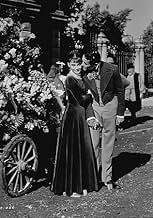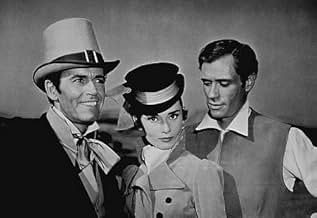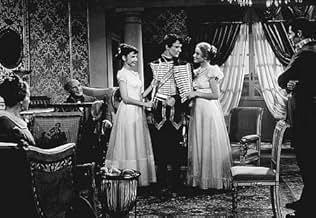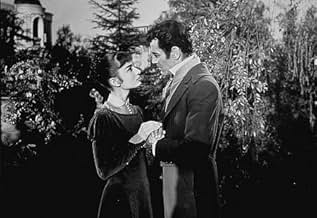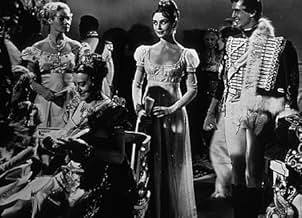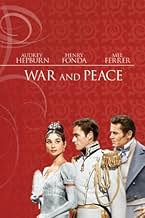Napoleons turbulente Beziehungen mit Russland, darunter seine katastrophale Invasion 1812, dienen als Hintergrund der verwickelten persönlichen Lebenswege zweier aristokratischer Familien.Napoleons turbulente Beziehungen mit Russland, darunter seine katastrophale Invasion 1812, dienen als Hintergrund der verwickelten persönlichen Lebenswege zweier aristokratischer Familien.Napoleons turbulente Beziehungen mit Russland, darunter seine katastrophale Invasion 1812, dienen als Hintergrund der verwickelten persönlichen Lebenswege zweier aristokratischer Familien.
- Für 3 Oscars nominiert
- 6 Gewinne & 13 Nominierungen insgesamt
- Prince Bolkonsky
- (as Wilfred Lawson)
Empfohlene Bewertungen
The narrative here focuses mainly on just three of Tolstoy's characters – Pierre, Natasha and Alexei – portrayed by Henry Fonda, Audrey Hepburn and Mel Ferrer respectively. Fonda is really too old to play the youthful Pierre, but he is not as severely miscast as some have said, pulling off the early scenes of Pierre as the gangly, drunken student with a fair degree of believability. Hepburn brilliantly handles the aging of her character, transforming the naïve teenager into a mature and confident woman while still maintaining the same core persona. If only something as complementary could be said of Mel Ferrer, who takes to acting the same way anvils take to floating. His appallingness is matched only by the woman who plays his wife, Milly Vitale. There are some decent supporting players though. Herbert Lom gives a surprisingly heartfelt performance as Napoleon. Oskar Homolka brilliantly plays the archetypal scruffy old general who's too high-ranking and experienced to bother with all that decorum business, his gestures forceful but with a half-hearted brevity to them. And John Mills is bizarrely like someone out of a Monty Python film.
Director King Vidor was a veteran of old Hollywood and just the sort of director to handle the mix of big canvas and intimacy. He shows what must have been extraordinary patience in setting up hordes of extras, carts and cannons for authentic looking crowd scenes, but then makes them a briefly glimpsed backdrop, never really dwelling on the massive scope or showing it off for its own sake. This seemingly contradictory tack gives us a sense of the story happening in a real place, but never allows it to detract from the main players and their stories. Vidor is constantly implying things with the simplest of cinematic tricks, and this helps to make up for the gaps in plot that the adaptation necessitates. For example, when Hepburn and Vittorio Gassman kiss at the opera, the angle gradually changes to reveal the reflection of a door in a mirror. This subtle move plants the idea in our heads that someone may walk in on them, and it gives the moment a sense of unease and wrongness. Vidor's canny ability to suggest mood and temperament, particularly evident in his framing of the inner monologues during the dance scene, also helps to cover any deficit in the acting.
At three-and-a-half hours, this is still quite a long old movie. And yet, thanks to some compelling imagery and strong narrative it moves faster than many a 90-minuter. Shorn of much of Tolstoy's original material as it is, it is still long enough to give us that feeling of the passage of time and development of character, to make Fonda's transition from a foppish lad in Western European attire to a bearded man in Russian garb feel like more than just a change of clothes. This version of War and Peace certainly has a fair few things wrong with it, yet still manages to be a lucid and passionate – if not entirely faithful – adaptation of a great work of literature.
Thus, it must inevitably slight: a) many of the characters who bring joy to reading the novel - the princely father of the Kuragins, Sonja's story, Nicholas falling in love with Marya, the forgiveness by Bolkonsky (Ferrer) of Anatole Kuragin when his leg is amputated on a table beside which he is lain out, etc. and b) much of the philosophy contained in the book - whether about the masons or the purpose of life.
However, as a sort of highlights version of the novel, I thought it dealt well with the main lines of the plot.
It also is clearly 1950s film-making. There is little sense indoors of the lighting of the time, the sets look generally clean or deliberately destroyed (rather than mysterious and gloomy). In fact, the entire film appears all too clearly delineated - there is little of the kind of murkiness one would find in such a movie being made today - say, the way Schindler's List looks - or The Last Emperor looks.
The movie is also benefitted by having Audrey Hepburn, Anita Ekberg and John Mills - physically they are EXACTLY what I imagined of these characters - and I thought Mills and Hepburn were excellent. (And what Ekberg lacked in ability to convey emotion, she gained from her jaw-dropping embodiment of the buxom blonde!). The Henry Fonda choice for Bezuhov is an odd one - he's not the first person I think of when I think of a huge heavy awkward bear of a man. He did the best he could but was clearly miscast. Prince Bolkonsky (the father) and the Count and Countess Rostov were first rate - so were the choices for Napoleon, Homolka as Kutuzov, Kuragin, Dolokhov and the Rostov family. Mel Ferrer was ok - but imagine, say, the Terence Stamp of Far From the Madding Crowd and how he could have done.
All in all, this is clearly a movie of its time in cinematography, sets, the clearly drawn lines of the script - but it is entertaining and does about as well as possible in dramatizing in 3 1/2 hours a book of over 1000 pages.
There are flaws. The script, though a model of clarity (unlike most literary adaptations, which concentrate on all the big set-pieces, creating narrative confusion), but short on inspiration. There is a dispiriting, unimaginative reliance on voiceover, and unnecessary soliloquys. The whole thing also goes on way too long.
Mel Ferrer is, without doubt, the worst actor in the world; he plays the dashing, tragic Prince Andrei with all the vigour of a mouldy plank. His part is pivotal, narratively, thematically and symbolically, so he features in a lot of scenes where his monotonous lack of expression makes the film stop dead. Henry Fonda, in many ways ideal as the Tolstoy altar-ego Pierre, who must move morally from observer to actor, is frequently defeated by the terrible dialogue, making this wonderful actor seem clumsy and amateurish. (Herbert Lom, however, manages to suggest great humanity behind the hammy pomp of Napolean).
I only mention these faults to show that the film's critics have their point. I also suggest that WAR AND PEACE is nearly a masterpiece for two reasons. King Vidor, whose work I'm largely (and shamefully) unfamiliar with, directs this film with awesome, authoritive lightness of touch. He pays respectful lip service to the big Tolstoyan themes, focusing particularly on families, the relations between parents and children, old traditional reactionary Russia, and the tentative, youthful impulse towards freedom.
I say lip-service, because his main interest in the film lies elsewhere. It lies in the expression of the emotional life of his characters. For although the film is a massive historical epic, it works best as a domestic melodrama. Characters, who can't express themselves in this hierarchical society, are allowed a voice through the film's direction, which forsakes literal realism, to tell us what is going on in their heads (and hearts). Exaggerated colour and carefully contrived composition offer us a second, more subtle and personal story, to the main, surface narrative. This might make WAR AND PEACE a more right-wing work, ignoring the processes of history and the plight of the serfs, in favour of sympathising with a caste of slave-owners, but Hollywood was never very good at socio-economic analyses.
Vidor's other great theme seems to be nature, and man's relation to it. He has little interest in invoking a real nineteenth century Russia; his Moscow is as exquisitely artificial as Sternberg's THE SCARLET EMPRESS, and his use of architecture and space to both show the distances between people, and the the fathomless emptiness of the soul, is positively Antonionian. With the natural world, however, there is a real feeling, beyond mere backdrop scenery, that is unthinkable in any contemporary Hollywood film. Primarily a movie about people and history, it is eternal nature that watches on, the battles, deaths, retreats. Indeed, it is nature that saves the Russian people, in the face of massive military odds, and it is nature that frames the melancholy, yet hopeful, resolution. (It's also interesting to ask why, at the heighth of the Cold War, Hollywood should decide to make a great Russian epic? To tastelessly evoke a 'glorious' pre-Soviet past? Or to enjoy the razing of Moscow to the ground?)
The second reason to love this film is, of course, the incomparable, beautiful, Audrey Hepburn. She is so right as Natasha (when I read the book as a kid, I pictured Audrey all the way through, without even knowing she had played her on film), the saviour of the book, as well as the film. It is one of the great performances - its modernity and truth blows away the dusty period conventions (indeed, at her first ball, she is as moving as a 50s teenager at her prom). Her intelligence, insight, passion (and she is a lot more erotic in this film than her supporters ever give her credit for) and grace are perfectly in tune with Vidor's conception, and her scenes have an extraordinary emotional force. She is the life of the film, and its moral centre in the absence of a convincing Pierre. The film plods to a slow death without her. The film essays three moral developments - Natasha's, Pierre's and Andrei's, but hers is the most moving and tragic. The change to sadness and understanding of the once gay and vivacious Natasha seems a terrible loss.
The movie does suffer from two undeniable shortcomings. First is the atrocious sound recording that has blighted virtually every Italian movie ever made. As some of the comments have noted, movies shot at Rome's Cinecitta had their sound post-dubbed rather than recorded on the set. But actually, this practice was then (and remains) very common. The sound in Italian movies stands out simply because they were so bad at it. The brutal truth is, even the greatest masterpieces of Fellini, De Sica, Rosselini, etc. are less than they might have been because Italian sound technology was so slipshod. And so it is with WAR AND PEACE: it's hard to suspend disbelief when soldiers struggling across a river sound like someone dropping quarters into a toilet.
The other shortcoming is the appalling miscasting of Henry Fonda as Pierre Bezhukov. It's the worst performance of his career, and he looks and sounds about as Russian as a slice of pumpkin pie. One commenter here said Alec Guinness should have played Pierre. It's an intriguing suggestion, and of course Sir Alec was always good. Even better, I think, would have been Peter Ustinov. In 1956 he was Pierre to the very life.
But the rest of the casting is genuinely inspired. Oskar Homolka as Gen. Kutuzov, Barry Jones as Count Rostov, Jeremy Brett as Nikolai, Herbert Lom as Napoleon -- all could hardly be improved upon. And Audrey Hepburn was simply born to play Natasha. And Mel Ferrer as Prince Andrei ... well, he did have his faults as an actor (to say the least!), but at least he looked the part.
Beyond that, the movie has lavish production values, impressive battle scenes, and one truly great and powerful sequence, the French Army's disastrous retreat from Russia, that takes up much of the last hour.
There's no substitute, of course, for reading the novel (I've read it three times myself). But this 1956 movie makes a worthy introduction, and even helps to keep Tolstoy's complex plot straight when you do get around to reading it.
Wusstest du schon
- WissenswertesAudrey Hepburn's character was supposed to be thirteen when the movie begins. She was twenty-seven when this movie came out.
- PatzerThe marching band in the opening parade are all playing modern musical instruments.
- Zitate
Prince Andrei Bolkonsky: There must be something you want to do.
Pierre Bezukhov: I want to discover... everything! I want to discover why I know what's right and still do what's wrong. I want to discover what happiness is, and what value there is in suffering. I want to discover why men go to war, and what they really say deep in their hearts when they pray. I want to discover what men and women feel when they say they love.
- Crazy CreditsClosing credits epilogue: The most difficult thing - but an essential one - is to love Life, to love it even while one suffers, because Life is all. Life is God, and to love Life means to love God. Tolstoy "WAR and PEACE"
- Alternative VersionenTwo different versions of the main titles exists. Both of them in English. In the one, the credits are set against a neutral background, in the other against details of a painting of Napoleon in front of his troops.
- VerbindungenEdited into Bill & Teds verrückte Reise durch die Zeit (1989)
Top-Auswahl
- How long is War and Peace?Powered by Alexa
Details
- Erscheinungsdatum
- Herkunftsländer
- Offizieller Standort
- Sprachen
- Auch bekannt als
- War and Peace
- Drehorte
- Produktionsfirma
- Weitere beteiligte Unternehmen bei IMDbPro anzeigen
Box Office
- Budget
- 6.000.000 $ (geschätzt)
- Weltweiter Bruttoertrag
- 24.874 $
- Laufzeit3 Stunden 28 Minuten
Zu dieser Seite beitragen



